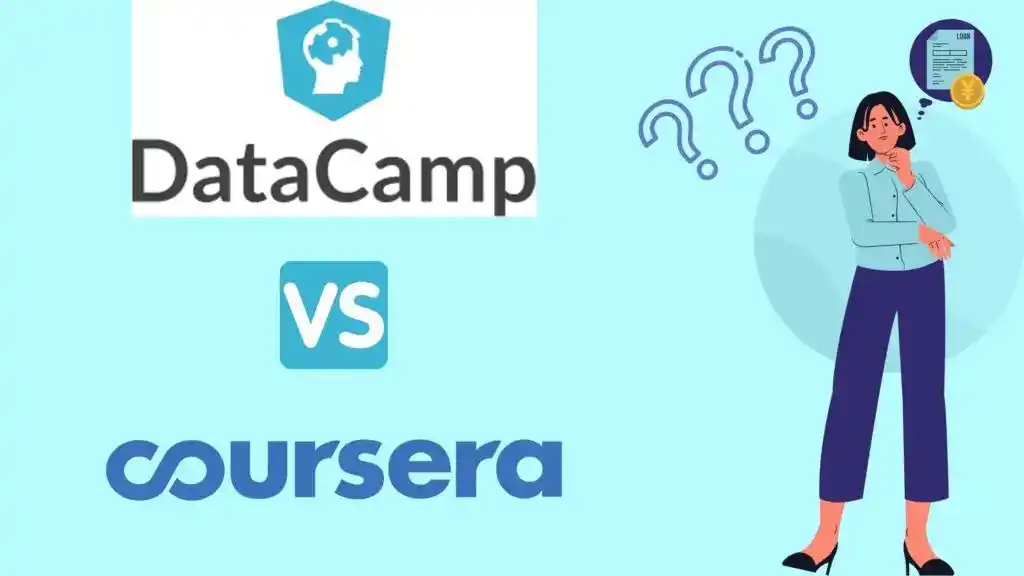As a Data Science learners, most of the time, we are confused between numerous learning platforms. Especially in between Datacamp vs Coursera for data science. So if you are not sure, then read this article and decide which platform is better for you.
Our Pick
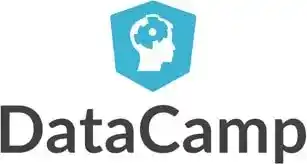
Why?
Because Datacamp is dedicated to Data Science and has a variety of Data Science courses. Datacamp has 342 courses, 51 skill tracks, and 14 career tracks. A career track helps you to boot your data science career. Datacamp is much cheaper than Coursera.
Now let’s start a comparison between Datacamp VS Coursera for Data Science. The major difference between DataCamp vs Coursera are-
DataCamp VS Coursera for Data Science
| Datacamp | Coursera | |
| Price | $12/month | $39/month |
| Best for- | DataCamp is for those who are new in the field of Data Science and want to learn the basics of Data Science. | Those who are looking for more advanced, detailed, structured, and credible courses from Top Universities. |
| Mode of Learning | DataCamp has self-paced video lectures. | Coursera also provides self-paced videos with schedule learning. |
| Learning Material | DataCamp has online courses and tracks in STEM fields. | Coursera provides courses, specialization programs, and online degrees. |
| Pros | 1. DataCamp courses are based on interactive learning with many videos and engaging exercises to complete. 2. DataCamp has a clear and simple pricing plan page. 3. DataCamp offers teacher discount policies. | 1. Well structured courses 2. All Courses are from educational institutions around the world. 3. Widest catalog of courses with a certification by a professional institution like Universities. |
| Cons | 1. DataCamp doesn’t provide Accredited Certificate. So If you are looking for a recognized validated certificate it is best to check out platforms like Coursera. | 1. Bit Expensive 2. Needs more commitment to the courses. |
| Check Datacamp | Check Coursera |
So, this is a brief comparison between Datacamp VS Coursera for Data Science. Now let’s compare both platforms with respect to these points-
DataCamp VS Coursera: Price
Whenever we plan for any course, the price is always a factor. While we should focus on overall value. So let’s understand how pricing and plan work-
DataCamp
As I mentioned earlier, Datacamp provides 3 three plans for individuals-
- Free
- Standard
- Premium
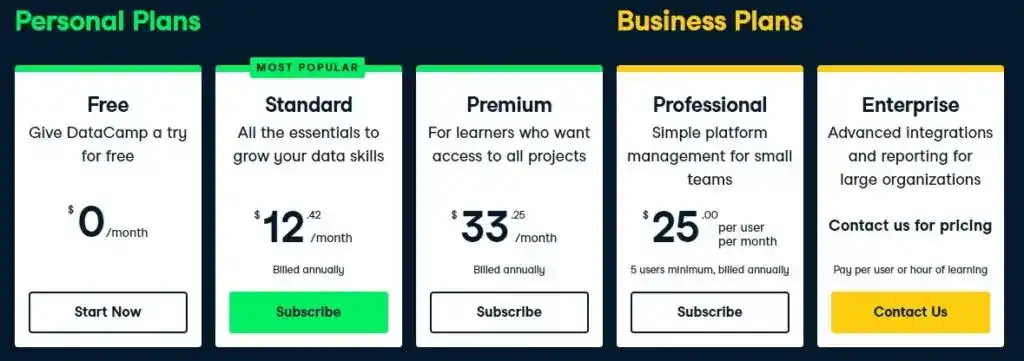
- In the free plan, you will get access to the first chapter of all courses, seven projects, three practical challenges, and one skill assessment. The free plan is quite limited and not very useful.
- The standard plan offers 335+ courses, 14 career tracks, unlimited skill assessments, and practice challenges, and much more. For the Standard plan, you have to pay $12/month.
- In the Premium plan, you have to pay $33/month and you will get everything that is included in Standard Plan plus 80+ projects, Tableau, Power BI, and Oracle content, and priority support.
Coursera
Coursera offers a 7 Day Free Trial so that you can learn free for 7 days. And if you find the course useful, then you need to pay a monthly subscription amount that is between $39 to $80 (based on the specialization program). Coursera also provides a financial aid option, so you can apply for financial aid.
Winner in Terms of Price
The winner is Datacamp because it is much cheaper than Coursera. And the pricing plan is more transparent in DataCamp.
DataCamp VS Coursera: Availability of Courses
DataCamp-
Datacamp offers 342 courses, 51 skill tracks, and 14 career tracks. Skill track is created for enhancing your skills such as Applied Finance, Text Mining, and Statistics Fundamentals. Whereas career track helps you to boot your data science career. Career Track includes areas such as Data Engineer, Data Analyst, and Machine Learning Scientist.
Coursera–
Coursera provides regular courses, online degrees, and specializations. Coursera has a wide range of courses from various fields like Arts and Humanities, Business, Data Science, Information Technology, Health, Math and Logic, Physical Science and Engineering, Social Sciences, and Language Learning.
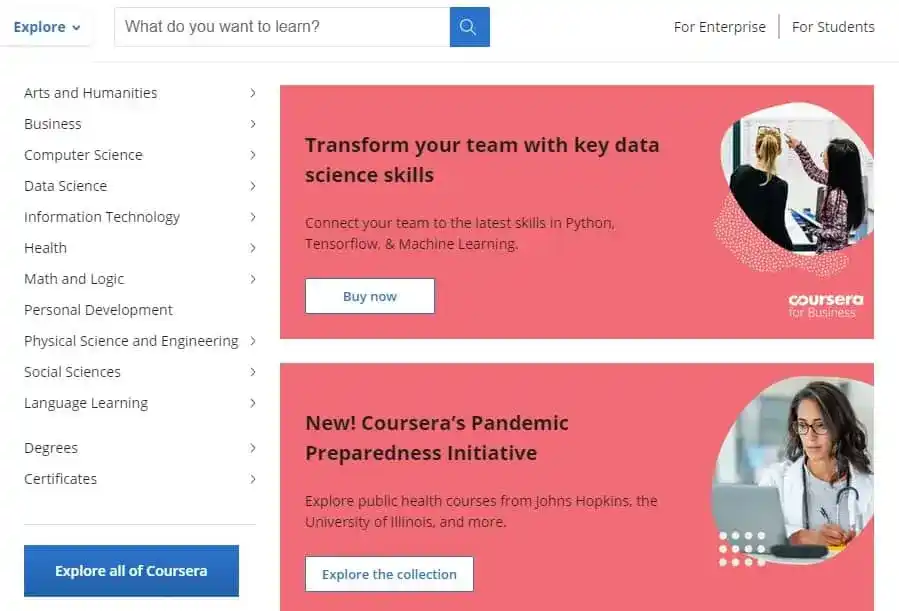
Who is the Winner?
Coursera is the winner because Coursera provides a more structured and wide range of courses.
DataCamp VS Coursera: Instructors
If you are planning to enroll in any data science course, I would recommend you to research who’ll be teaching you. The more details you collect, the better trust you can build with your instructor.
DataCamp
The Datacamp has around 300 instructors and all come from various organizations and Universities. Each instructor has a bio with a brief paragraph about the instructor’s background along with the links to other courses they teach. But I found some bios were quite unclear with titles such as “Data Scientist at Data Camp”.
Coursera
In Coursera, all the instructors are from renowned top Universities. Coursera also provides a brief bio, but also credentials, including experience and degrees.
Winner
In terms of Instructors, Coursera is a clear winner, because Coursera has more trusted and established Instructors. That’s why it becomes difficult to doubt their credentials.
DataCamp VS Coursera: Best Data Science Courses
DataCamp-
- Data Science for Everyone– This is a beginner-friendly course, where you will learn about the basics of data science like Introduction to Data Science, data science workflow, Data preparation, and experimentation and prediction. If you are a beginner, then this is another best course to begin your data science journey.
- Data Scientist with Python– This is a career track with 29 courses. If you are looking for a course that will provide all data science information in one place, then this the best pick for you. This career track begins with Python Programming. You will learn Python from scratch.
- Data Engineer with Python– In this career track, you will learn how to build an effective data architecture, streamline data processing, and maintain large-scale data systems.
- Learn R with DataCamp– If you want to get a basic understanding of R Programming, then Introduction to R is a good course. And if you have basic knowledge of R programming, then you can consider the Intermediate R course, where you will learn some advanced concepts of R programming.
- Data Analyst with Python– In this career track, there are 16 courses in a step-by-step manner, where you will learn how to import, clean, manipulate, and visualize data.
Coursera-
- IBM Data Science Professional Certificate– This is one of the highly enrolled and highly rated course series. This Professional Certificate from IBM is for anyone who wants to start a career in Data Science.
- Data Science Specialization– This is also one of the most highly rated and enrolled course series. In this course series, there is a separate section on statistics. And Knowledge of Statistics is mandatory for Data Science.
- Applied Data Science with Python Specialization– This specialization program teaches data science through the python programming language. You will get a strong introduction to data science Python libraries, like matplotlib, pandas, nltk, scikit-learn, and networkx.
- IBM Data Analyst Professional Certificate– In this Professional certificate program, you will learn the fundamentals of gathering data, cleaning data, analyzing the data, and how to share your data with the use of visualizations and dashboard tools.
- Statistics with R Specialization– This specialization program will give you more in-depth Statistics with the help of R. In this program, you will learn how to analyze and visualize data in R and create reproducible data analysis reports, and much more.
So, these are few data science courses available on Datacamp and Coursera. For more data science courses, you can check this article- 15 Best Online Courses for Data Science for Everyone
DataCamp VS Coursera: Time to Complete
DataCamp
In Datacamp, most of the courses are around 3-6 hours long. For example, Introduction to Data Science in Python course has 13 videos and takes 4 hours to complete.

Coursera
In Coursera, most of the Specialization program takes around 2-6 months to complete. But it depends upon how much time you are giving daily. For example, IBM Data Science Professional Certificate takes 10 months to complete if you spend 5hour/week. But if you spend more hours then you can complete the full IBM Data Science Professional Certificate in a month.
Coursera is much likely than an online class where you watch videos, then there are auto-graded and peer-reviewed assignments that you need to complete.
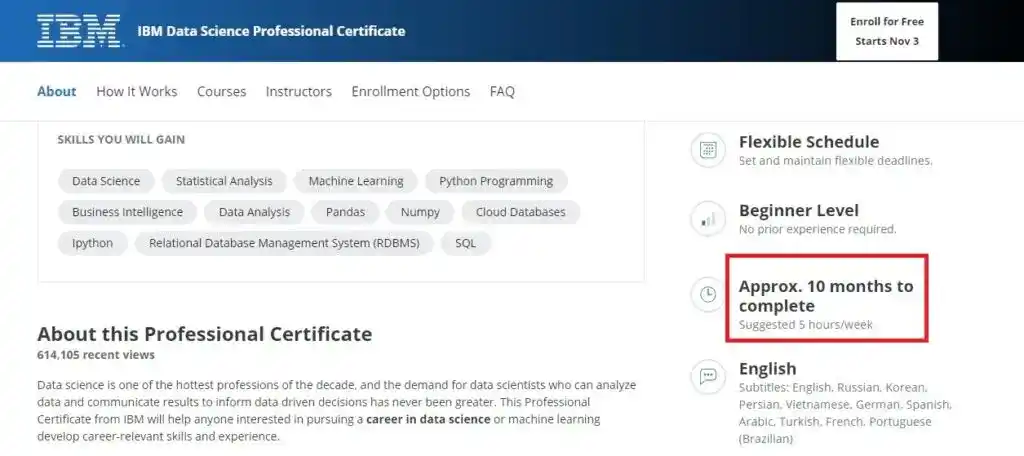
Who Should Enroll in DataCamp?
- Who is a beginner in data science and wants to learn data science basics.
- Who doesn’t want to invest extra money in learning data science.
Start Learning at Datacamp
Who Should Enroll in Coursera?
- Who is intermediate and advanced learners and want to gain in-depth knowledge of data science.
- Who wants to learn Data Science from a formal university and by experienced instructors from the world’s top universities.
- Who is looking to get a certificate (not so much important) from an accredited institution.
- Who can invest a few extra bucks to learn data science.
Start Learning at Coursera
Conclusion:
I hope now you have a clear understanding of both platforms Datacamp vs Coursera. I hope this comparison Datacamp VS Coursera for Data Science will help you to decide which platform is better for you to learn Data Science based on your needs.
If you have any questions, feel free to ask me in the comment section. I am here to help you. And If you found this article helpful, share it with others to help them too.
All the Best for your Data Science Journey!
Happy Learning!
FAQ
You May Also Interested In
Coursera vs Udemy for Data Science: Which One is Better?
Best Online Courses for Data Science to become A Skilled Data Scientist
Applied Data Science With Python Specialization Review- Things to Know
IBM Data Science Professional Certificate Review- All You Need to Know
Best Course on Statistics for Data Science to Master in Statistics
8 Best Tableau Courses Online- Find the Best One For You!
8 Best Online Courses on Big Data Analytics You Need to Know in 2025
Best SQL Online Course Certificate Programs for Data Science
Best Online Courses for Excel to become an Expert!
7 Best SAS Certification Online Courses You Need to Know
Data Analyst Online Certification to Become a Successful Data Analyst
15 Best Books on Data Science Everyone Should Read in 2025
How to Get a Data Analyst Job with no Experience and with Experience
Thank YOU!
Explore More about Data Science, Visit Here
Subscribe For More Updates!
[mc4wp_form id=”28437″]
Though of the Day…
‘ It’s what you learn after you know it all that counts.’
– John Wooden
Written By Aqsa Zafar
Founder of MLTUT, Machine Learning Ph.D. scholar at Dayananda Sagar University. Research on social media depression detection. Create tutorials on ML and data science for diverse applications. Passionate about sharing knowledge through website and social media.

